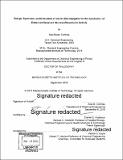| dc.contributor.advisor | Daniel G. Anderson. | en_US |
| dc.contributor.author | Cortinas, Abel Bryan. | en_US |
| dc.contributor.other | Massachusetts Institute of Technology. Department of Chemical Engineering. | en_US |
| dc.date.accessioned | 2019-07-18T20:31:26Z | |
| dc.date.available | 2019-07-18T20:31:26Z | |
| dc.date.copyright | 2018 | en_US |
| dc.date.issued | 2018 | en_US |
| dc.identifier.uri | https://hdl.handle.net/1721.1/121809 | |
| dc.description | Thesis: Ph. D., Massachusetts Institute of Technology, Department of Chemical Engineering, 2018 | en_US |
| dc.description | Cataloged from PDF version of thesis. | en_US |
| dc.description | Includes bibliographical references (pages 132-143). | en_US |
| dc.description.abstract | Since its discovery by Banting and Best, the administration of exogenous insulin to control blood glucose levels has been a primary method of treatment for severe cases of diabetes mellitus. Several decades of insulin engineering and development has led to the clinical introduction of two broadly classified categories of protein therapies: prandial and basal insulins. Although these developments have had profound effects on disease management with respect to insulin-dependent diabetes, the overall strategy for development has historically been restricted to rational design criteria based on static pharmacodynamic profiles, profiles that are inherently naive to physiological changes in the diabetic patient. As a result, stringent patient-dependent regimens are the standard of care with regard to glycemic monitoring and management. | en_US |
| dc.description.abstract | When coupled with issues such as patient noncompliance, severe hypoglycemia, as well as the adverse health effects that result from chronic mismanagement of hyperglycemia, it is obvious that there are still major hurdles that must be overcome to properly treat the disease. Herein, we introduce innovative strategies aimed towards the advancement of novel insulin bioconjugate design and development for enhanced long-term efficacy and glucose-responsive activity. First, we develop a class of unimolecular, glucose-responsive insulin conjugates towards the design of a state-responsive, patient-dependent therapy. | en_US |
| dc.description.abstract | Optimization of this system resulted in the identification of a lead candidate, lns-PL-4FPBA, capable of (1) glucose-mediated changes in solubility for long-term sequestration and intelligent depot formation, (2) superior safety in comparison to clinically used long-acting insulins, and (3) glucose-responsive pharmacokinetic and pharmacodynamic activity in both healthy and diabetic animal models. Next, we pioneer the first design and synthesis strategy of a novel class of sugar-responsive insulin conjugates, with the ultimate goal of developing an insulin bioconjugate capable of sugar-mediated receptor binding interactions. In this effort, we created dynamically cyclized insulin conjugates that were found to exhibit enhanced chemical stability and superior thermal stability relative to the native protein, as well as sugar-mediated destabilization, suggesting the potential to exploit the insulin receptor binding mechanism. | en_US |
| dc.description.abstract | Lastly, we focus on improving basal activity of the insulin protein by utilizing a novel class of zwitterionic insulin polymer conjugates towards the generation of ultra long-acting insulin therapies. The resulting library is demonstrated to afford equivalent biological potency relative to native human insulin, augmented thermal and chemical stability capable of withstanding thermal aggregation for over 80 days, as well as ultra long-acting basal insulin potential. | en_US |
| dc.description.statementofresponsibility | by Abel Bryan Cortinas. | en_US |
| dc.format.extent | 143 pages | en_US |
| dc.language.iso | eng | en_US |
| dc.publisher | Massachusetts Institute of Technology | en_US |
| dc.rights | MIT theses are protected by copyright. They may be viewed, downloaded, or printed from this source but further reproduction or distribution in any format is prohibited without written permission. | en_US |
| dc.rights.uri | http://dspace.mit.edu/handle/1721.1/7582 | en_US |
| dc.subject | Chemical Engineering. | en_US |
| dc.title | Design, synthesis, and evaluation of insulin bioconjugates for the application of enhanced basal and glucose-responsive activity | en_US |
| dc.type | Thesis | en_US |
| dc.description.degree | Ph. D. | en_US |
| dc.contributor.department | Massachusetts Institute of Technology. Department of Chemical Engineering | en_US |
| dc.identifier.oclc | 1103712071 | en_US |
| dc.description.collection | Ph.D. Massachusetts Institute of Technology, Department of Chemical Engineering | en_US |
| dspace.imported | 2019-07-18T20:31:24Z | en_US |
| mit.thesis.degree | Doctoral | en_US |
| mit.thesis.department | ChemEng | en_US |
